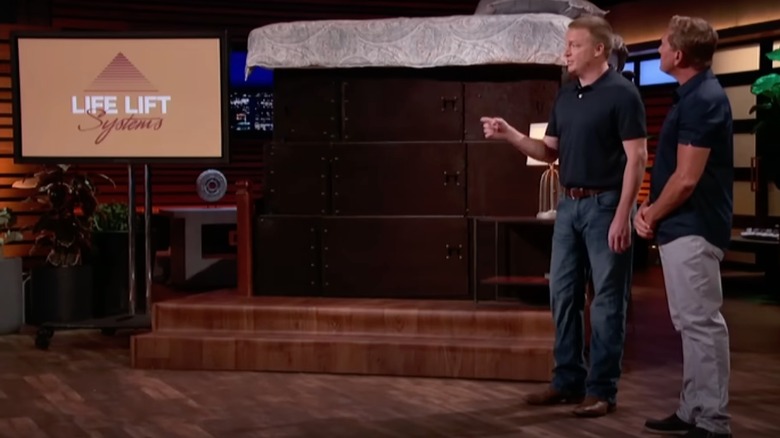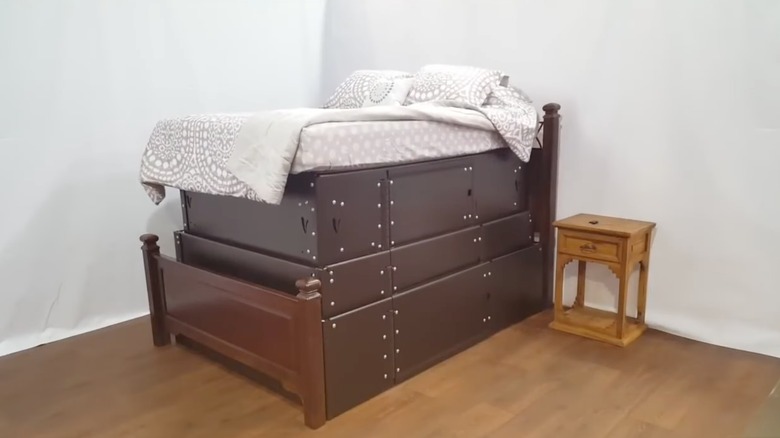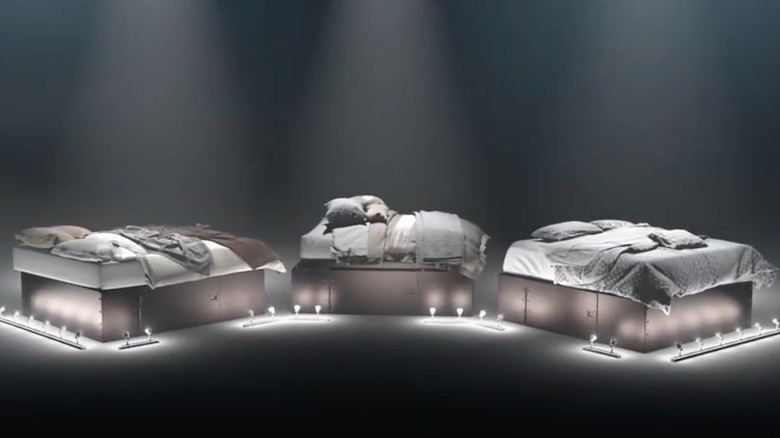Whatever Happened To Storm Shelter Bed By Life Lift Systems After Shark Tank Season 10?
One of the most dynamic and safety-minded products presented during Season 10 of "Shark Tank" was Levi Wilson and Tim Todd's storm shelter bed from Life Lift Systems. It seemed to be an ingenious solution to storm shelters that could fit discreetly in your home. Both raised in the United States' Tornado Alley — a belt of severe weather through the lower Midwest and South — the two engineers sought to provide a safe solution to storms and other environmental threats.
The telescoping bed, which can withstand up to 250 mph winds and extreme impact force, is accessed by raising the mattress and box spring to enter the vault, which is bolted to a slab of concrete beneath. The vault rises at the touch of a button and fits several people inside, offering a secure and damage-resistant place to safely weather even the worst storms. The bulletproof enclosure is also a safe room for home invasions, complete with air vents, USB chargers, and emergency lighting, all powered by a 12-volt DC battery.
What happened during the Shark Tank episode?
The proposal for the Life Lift Systems bed immediately caught the attention of several sharks, inciting discussions of the feasibility and profit margins of the company. At the time, it was offering low wholesale prices that undercut the cost of creation, and many sharks worried it would make the venture less profitable. Levi Wilson and Tim Todd discussed future plans for the company, including other home items that would harbor secret storm shelters and safe rooms, including a workbench, a kitchen island, and a pool table.
While sharks Robert Herjavec and Kevin O'Leary bowed out, there was particular interest from Lori Greiner and Mark Cuban, both of whom initially offered the requested amount of $550,000 at a 25% ownership. After making an unsuccessful counteroffer of 20%, Todd and Wilson agreed to Cuban's offer. They were swayed by the investor's Texas home base, which he claimed would make him more accessible to them during development in nearby Oklahoma.
What happened to Life Lift Systems after the show?
According to the product's creators, "Shark Tank" fans and social media users helped spread the word about their product immediately. "It went viral in about 25 states overnight, so what we have done since then is [put] distributors in place, then [help] distributors put dealers in place," Tim Todd told Accuweather. "Since it aired on Jan. 27, 2019, I'm probably on the phone 10 to 12 hours a day, every day."
While things seemed to look good for the future, this boost in popularity wouldn't last long. After their appearance on the show, the creators of Life Lift Systems decided to rebrand as Vortex Vaults. While the product was fairly popular, especially among preppers and those living in areas frequently impacted by severe storms, it appears that many customers weren't satisfied with their purchases. At one point, disgruntled buyers even created a public Facebook group to provide each other with advice in the face of a myriad of functional and maintenance issues. Members stated that their beds were misaligned, frequently lost power, and had issues raising. With all of these apparent problems, it's no surprise that the company went out of business. While the idea seemed to have good intentions and a passionate team behind it, it's clear that they fell short when it came time to deliver on their promises.
What are the founders up to now?
According to co-founder Tim Todd's Linkedin page, his involvement with Life Lift Systems/Vortex Vaults ended in June 2019, just a few months after the original "Shark Tank" episode aired. Since then, he's maintained his position as founder and CEO of Delta Heavy Metal — a welding facility — and has continued in the same role at Delta Promotions Team, a marketing agency. He's also now CEO of WeedHosters, a company intending to bridge the gap between medical marijuana distributors and customers.
Unfortunately, there isn't much information out there about Todd's business partner, Levi Wilson, so it's unclear if he intends to give their business idea another go. If he's the one to try it out, it's obvious from the initial virality and response on social media that there was sizable demand for this kind of product. Unfortunately, you need more than a good idea to be successful in the business world. The execution doesn't seem to have been there, but who knows — maybe another company will give this idea a go and get something similar on the market in the future.



